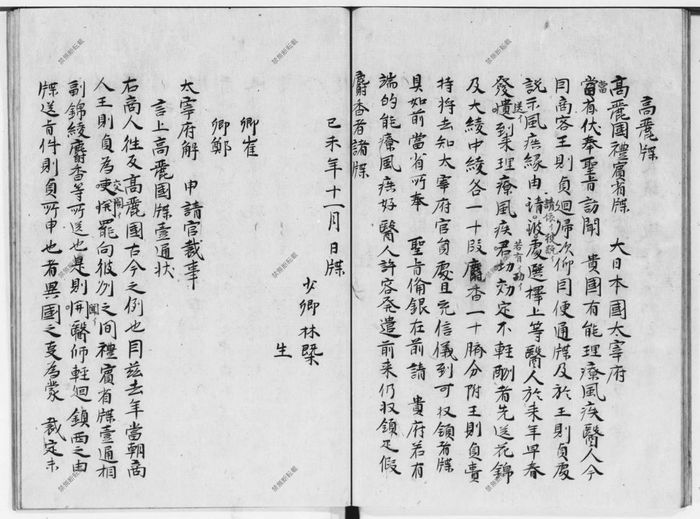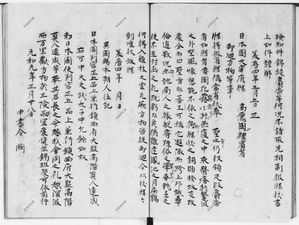"(Translation) 1079年 高麗禮賓省牒"의 두 판 사이의 차이
Jangseogak (토론 | 기여) |
|||
| 119번째 줄: | 119번째 줄: | ||
| − | ==='''Student 1 : | + | ==='''Student 1 : Yishu Ma'''=== |
---- | ---- | ||
*Discussion Questions: | *Discussion Questions: | ||
| − | + | - Why and how did the medical exchanges become a means of developing diplomatic relations between Korea and Japan during the 11th century? | |
==='''Student 2 : Samuel Sai Hay Chan 陳世熙 진세희'''=== | ==='''Student 2 : Samuel Sai Hay Chan 陳世熙 진세희'''=== | ||
2019년 7월 10일 (수) 09:46 판
| Primary Source | ||
|---|---|---|
 |
Title | |
| English | ||
| Chinese | 1079年 高麗 禮賓省 牒 | |
| Korean(RR) | 1079년 고려 예빈성 첩(Goryeo Yebinseong Cheop) | |
| Text Details | ||
| Genre | Royal Court Documents | |
| Type | Diplomatic Document | |
| Author(s) | 禮賓省 | |
| Year | 1079 | |
| Source | IMG. National Institute of Japanese Literature (国文学研究資料館) | |
| Key Concepts | ||
| Translation Info | ||
| Translator(s) | Participants of 2019 JSG Summer Hanmun Workshop (Advanced Translation Group) | |
| Editor(s) | ||
| Year | 2019 | |
목차
- 1 Introduction
- 2 Original Script
- 3 Discussion Questions
- 4 Further Readings
- 5 References
- 6 Translation
- 6.1 (sample) : Jaeyoon Song
- 6.2 Student 1 : Yishu Ma
- 6.3 Student 2 : Samuel Sai Hay Chan 陳世熙 진세희
- 6.4 Student 3 : Younès M'Ghari
- 6.5 Student 4 : King Kwong Wong
- 6.6 Student 5 : (Write your name)
- 6.7 Student 6 : (Write your name)
- 6.8 Student 7 : Russell Guilbault
- 6.9 Student 8 : (Write your name)
- 6.10 Student 9 : (Write your name)
- 6.11 Student 10 : (Write your name)
- 6.12 Student 11 : (Write your name)
- 6.13 Student 12 : (Write your name)
- 6.14 Student 13 : (Write your name)
- 6.15 Student 14 : (Write your name)
Introduction
1079년(고려 문종33) 고려 예빈성에서 일본 대재부에 보낸 외교문서.
기미년(1079: 文宗33) 11월에 고려 禮賓省에서 일본 大宰府에 보낸 牒이다. 風疾을 잘 고치는 醫人을 선발하여 고려에 보내 달라는 내용이다. 당시 풍질로 고생하고 있던 고려 국왕 문종이 고려와 일본을 오가는 상인으로부터 일본에 풍질을 잘 고치는 의사가 있다는 말을 듣고 선물과 함께 이 첩을 보낸 것이다. 당시 고려와 일본은 정식으로 국교관계를 수립하지 않았기 때문에, 이 첩은 정식사절단이 아니라 상인을 통해 전해졌다. 원문서는 전하지 않고, 일본 사서인 『朝野群載』(卷20 異國)에 轉載된 내용만이 남아 있다. 이 책에는 이 첩에 대한 答書 즉, 일본 大宰府에서 고려 예빈성으로 보내는 牒文도 함께 수록되었다. 이 문서는 이듬해인 1080년에 보내진 것이다. 일본에서는 본 첩에서 고려 국왕의 명령을 ‘處分’이라고 하지 않고 ‘聖旨’로 칭한 것이 무례하다고 하여 접수하지 않고 고려에서 보낸 선물과 함께 되돌려 보내었다.
Original Script
| Classical Chinese | English |
|---|---|
|
高麗國禮賓省牒大日本國太宰府 當省伏奉 聖旨訪聞 貴國有能理療風疾醫人今 因商客王則貞廻歸次仰 因便通牒及於王則貞處 說示風疾緣由請彼處選擇上等醫人於來年早春 發送到來理療風疾若有功効定不輕酬者今先送花錦 及大綾中綾各一十段麝香一十臍分附王則貞賚 持將去知大宰府官員處且充信儀到可收領者牒 具如前當省所奉 聖旨備錄在前請 貴府若有 端的能療風疾好醫人許容發遣前來仍收領疋段 麝香者諸牒 己未年十一月 日牒 小卿林槩 生 卿崔 卿鄭
言上高麗國牒壹通狀 右商人往反高麗國古今之例也 因玆去年當朝商 人王則貞爲吏開(交開)罷向彼州之間禮賓省牒壹通相 副錦綾麝香等所送也 是則聞(?)醫師輕廻鎭西之由 牒送旨件則貞所申也者異國之吏爲蒙(?) 裁定未 檢知件錦綾麝香等何況 不聽取 先相副彼牒狀言 上如件謹解 承曆四年三月五日 正 |
(translation) |
Discussion Questions
Further Readings
References
『한국고대중세고문서연구』(상), 노명호 외 편, 서울대학교출판부, 2000
Translation
(sample) : Jaeyoon Song
- Discussion Questions:
Student 1 : Yishu Ma
- Discussion Questions:
- Why and how did the medical exchanges become a means of developing diplomatic relations between Korea and Japan during the 11th century?
Student 2 : Samuel Sai Hay Chan 陳世熙 진세희
- Discussion Questions:
Why was the Korean court asking for a physician from Japan? Was there a lack of qualified physicians in Korea itself? What did the request tell us about the medical culture at the time?
Student 3 : Younès M'Ghari
- Discussion Questions:
What was the disease mentioned by the court of the Koryô kingdom? Is there any other document mentioning this issue?
What made the court of the Koryô kingdom choose the expression 성왕 when adressing this letter to the Japanese? Was it the first time?
Student 4 : King Kwong Wong
- Discussion Questions:
What was the historical background of this document? How does this document reveal Koryŏ's (Goryeo) stance toward Japan?
What were the roles of merchants in the diplomatic relations between Koryŏ and Japan?
Student 5 : (Write your name)
- Discussion Questions:
Student 6 : (Write your name)
- Discussion Questions:
Student 7 : Russell Guilbault
- Discussion Questions:
- How does this document fit into the broader history of Korea-Japan relations? In previous interactions, how did the Goryeo court refer to itself? How did Korea-Japan relations proceed after this rebuke from Japan?
Student 8 : (Write your name)
- Discussion Questions:
Student 9 : (Write your name)
- Discussion Questions:
Student 10 : (Write your name)
- Discussion Questions:
Student 11 : (Write your name)
- Discussion Questions:
Student 12 : (Write your name)
- Discussion Questions:
Student 13 : (Write your name)
- Discussion Questions:
Student 14 : (Write your name)
- Discussion Questions:
